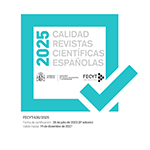The New Realism in Latin American philosophy. Review of ontological and epistemological assumptions in the realism of M. Beuchot: I. The nature-culture dualism.
Abstract
In this paper, within the framework of the emergence of the new realisms of the 21st century and their manifestation in Latin America, the New Analogical Realism of Mauricio Beuchot is addressed in particular. The Mexican philosopher understands that a large part of the philosophical developments of the 20th century have led to relativism, and that, given the socio-political consequences produced, it is necessary to compensate for realism. In this work, the possibility of compensating realism and avoiding relativism is problematized, starting from the same bases as those of the philosophies in question. Our objective is to review one of the ontological and epistemological assumptions that underlie said realism and evaluate its scope, while questioning its declared criticality. This analysis will allow us to sustain, based on the anthropological studies of Philippe Descola, that Beuchot’s realism succumbs to the same relativism that he questions and, consequently, from this perspective, his proposal is insufficient to compensate realism and avoid relativism.
Downloads
Article download
License
In order to support the global exchange of knowledge, the journal Logos. Anales del Seminario de Metafísica is allowing unrestricted access to its content as from its publication in this electronic edition, and as such it is an open-access journal. The originals published in this journal are the property of the Complutense University of Madrid and any reproduction thereof in full or in part must cite the source. All content is distributed under a Creative Commons Attribution 4.0 use and distribution licence (CC BY 4.0). This circumstance must be expressly stated in these terms where necessary. You can view the summary and the complete legal text of the licence.











